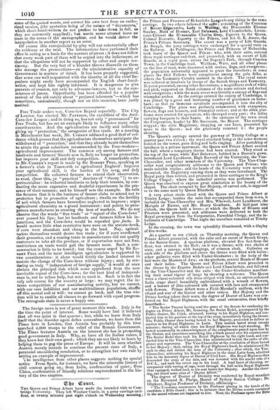Free Trade makes way, Corn-law Repeal especially. The City of
Loudon has elected Mr. PATTISON, the candidate of the Anti- Corn-law League ; and in doing so, has not only " pronounced" for Free Trade, but has set an example likely to influence many other constituencies. And the agriculturists are tacitly and indirectly giving up "protection," the antagonist of free trade. At a meeting in Manchester last week, Mr. COBDEN adduced a good deal of evi- dence which proves that the agriculturists themselves anticipate the withdrawal of " protection," and that they already bestir themselves to attain the great substitute recommended by the Free-traders— agricultural improvement. The common cry among farmers and landlords and farmers' friends now is, Rely no longer on protection, but improve your skill and defy competition. A remarkable echo to Mr. COBDEN'S report is made by Sir ROBERT PEEL, speaking at a farmer's club in Tamworth to agricultural England: Improve your agricultural skill, is the burden of his song, and defy competition. He exhorted farmers to extend their observation, to read, (hear this, ye "practical" decriers of " theory "!) to ex- perimentalize : he exhorted landlords to help their tenants, by con- ducting the more expensive and doubtful experiments in the pre- sence of their tenants; and he himself sets the example. He tells the farmers that it is the business of farmer clubs to attend not to protection but to promotion of agriculture ; dwells on the fertility of soil which farmers have heretofore neglected to improve ; urges agricultural chemistry as a grand instrument ; and points to pros- perous manufactures as creating the best of markets. We do not observe that the words "free trade" or "repeal of the Corn-laws" ever passed his lips; but let landlords and farmers follow his in- junctions, and the Corn-laws would be repealed ipso facto. It would matter little what restrictive laws were on the statute-book, if corn were abundant and cheap in the land. Nay, agricul- turists themselves would desire free trade ; for if corn overflowed their granaries, and a roaring trade in manufactures did not qualify customers to take all the produce, or if exportation were not free, restrictions on trade would gall the farmers most. Such a con- summation is little to be feared ; but the course urged by Sir Ro- BERT PEEL and the most intelligent agriculturists is supported by two considerations : it alone would fortify the landed interest to sustain the change of the Corn-laws without injury ; and, by ren- dering us truly " independent of foreign supply," it would at once obviate the principal risk which some apprehend from the now inevitable repeal of the Corn-laws; for the best kind of independ- ence is, not to refuse help, but not to need it. Such is in fact the only safe course for the country at large : we may regret the in- tense competition of our manufacturing activity, but we cannot, with our vast liabilities and our multitudinous population, shuffle off this mortal coil at will: we cannot go back, and the true wis- dom will be to enable all classes to go forward with equal progress. The retrograde state is never a happy one.


























 Previous page
Previous page